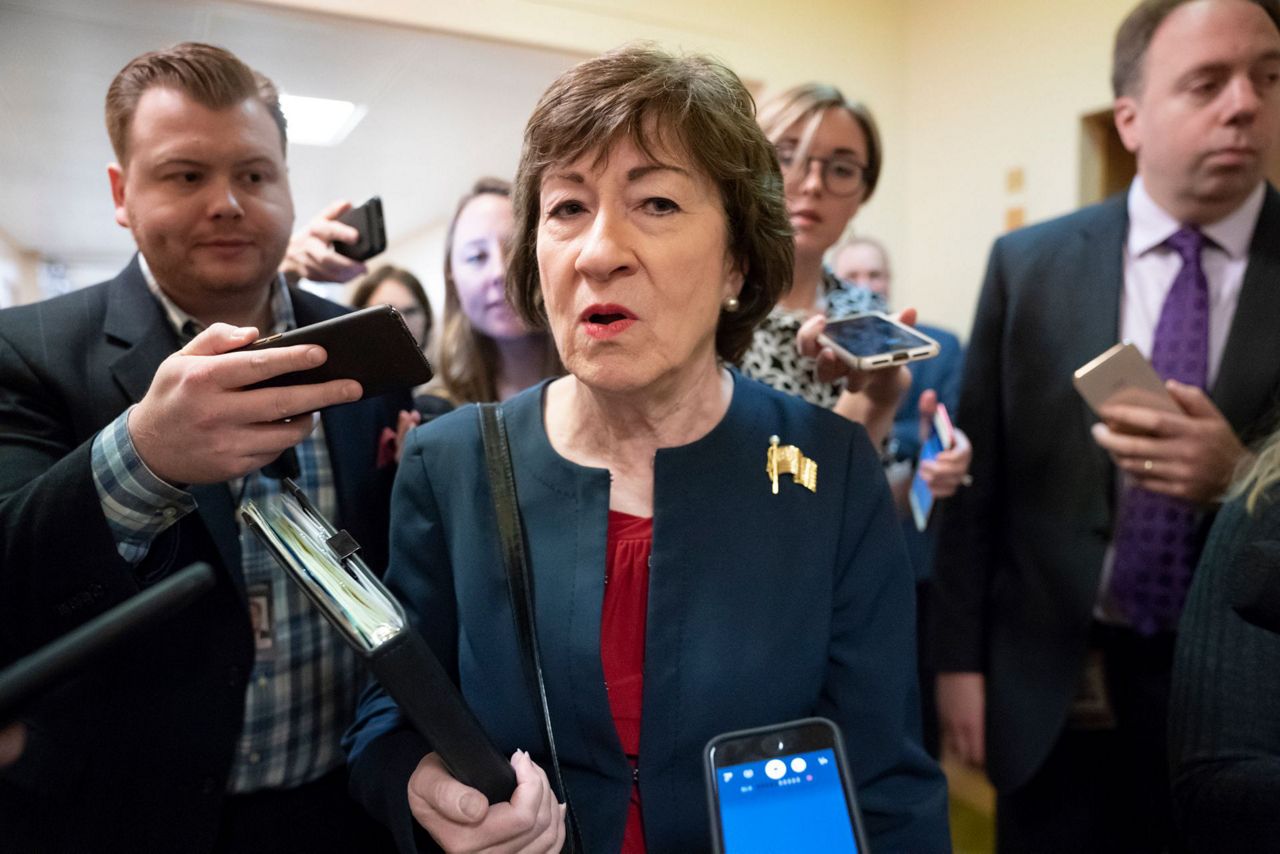PORTLAND, Maine (AP) — Republican Sen. Susan Collins officially launched her bid for reelection Wednesday, setting up an expensive and closely watched battle that's starting against the backdrop of impeachment proceedings against President Donald Trump.
Collins, who made her formal announcement in an email to supporters, said she took her time with her decision and concluded her “bipartisan commonsense approach” will be important in an era of bitter partisanship.
“I wanted to think hard about whether there's still a role in Washington for someone who’s in the middle who believes in bipartisanship, compromise and collegiality. Those used to be the hallmarks of the Senate but in recent years have become increasingly rare as the Senate has become more and more polarized,” she told The Associated Press.
Collins also said her seniority in the Senate can help Maine. She said that if reelected she would become chairwoman or ranking Republican of the powerful Appropriations Committee in 2023. The last time a Maine senator led the committee was in the 1930s, she said.
Collins’ campaign for a fifth term could be her most difficult race yet and is projected to be the most expensive political race in Maine history. With the 2020 election less than one year away, the 67-year-old centrist is viewed as freshly vulnerable in a state where a tradition of political independence is clashing with rising polarization and partisanship.
Democrats have targeted Collins for her votes for Supreme Court Justice Brett Kavanaugh and the GOP tax cut. They have also sought to link her to Trump and his brand of brash, divisive politics, and have accused her of failing to do enough to stand up to him. Trump is reviledby manyin the state’s populous south, anchored by liberal Portland, but cheered in the rural north.
Collins, who says she didn’t vote for Trump in 2016, is likely to face a dramatic vote on whether to convict the president in an impeachment trial in the Senate, a decision that will anger either Democrats or Republicans.
Her statement was made hours before the House vote to impeach the president. The statement made no mention of impeachment proceedings but acknowledged the nation’s deep divisions: “To say that these are difficult and contentious times is most certainly an understatement. But our country has confronted much more challenging times in our history,” she wrote.
First elected in 1996, Collins has practiced a measured, moderate brand of politics aligned with the ethos of a state where unenrolled voters comprise the biggest voting bloc. Her popularity has held even as she remains the last New England Republican in Congress.
She has shown her independence by trying to distance herself from Trump. She criticized his emergency declaration to build a wall at the southern border, stood up for the anonymous whistleblower under attack by Trump, and criticized the president’s withdrawal of troops from Syria.
On impeachment, she has avoided weighing in by noting that she could become a juror in a trial in the Senate.
Four Democrats vying for the party’s nomination to face her include Maine House Speaker Sara Gideon, who is backed by the Democratic Senatorial Campaign Committee. The others are activist Betsy Sweet, attorney Bre Kidman and former Google executive Ross LaJeunesse.
Gideon raised $1 million more than Collins in the most recent reporting cycle. But Collins has raised more than double Gideon’s amount — $8.6 million — the largest of any political candidate in Maine history.
Gideon said Collins “might have been different from other people" in Washington when she was first elected but "it doesn’t seem that way anymore.”
“These days, Senator Collins seems more focused on serving the special interests that fund her campaigns than the Mainers who elected her,” she said.
The Democratic nominee is also expected to benefit from a crowdsourced nest egg topping $4 million. With money pouring into the race from dark-money groups, pundits suggest upward of $80 million to $100 million could be spent on this race before Election Day 2020.
Collins met her self-imposed deadline of announcing her 2020 intentions this fall. Despite snow on the ground in her home state, it's still technically fall; the winter solstice arrives this weekend.
She said she felt compelled to announce her candidacy earlier than in past elections because of negative attack ads that she said have been distorting her record for months. In past elections, she waited until the year of the election to make her announcement.
“I have always thought that campaigns last too long and that it is better to hold off on the announcement for as long as you can in hopes of sparing the public the inevitable attack ads,” she said.
___
This story has been corrected to show Sen. Susan Collins is 67, not 66.
Copyright 2019 The Associated Press. All rights reserved. This material may not be published, broadcast, rewritten or redistributed.




